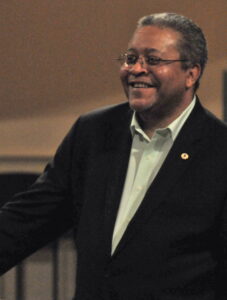|
Getting your Trinity Audio player ready...
|
Reading Time 4 mins
“…For [East] Indian Trinis, it meant no longer being ashamed of carrying ‘roti in paper bag’ for lunch!”
In a sense, this thought sums up the moral and cultural meaning and impact of the 1970 Uprising in T&T on the people of T&T and their
identity.
Trinidad & Tobago had such an episode in 1970. To demystify what was going on and untangle the overthinking and web of confusion by some intellectuals: wittingly or unwittingly, we were writing the T&T chapter of a global struggle for Human Rights that was unfolding among oppressed peoples everywhere, which gained transformative momentum following the end of WWII.
1970 was a mass uprising, calling for “Power to the People!” instead of leaving real power in the hands of the former colonial ruling classes and their local proxies. Because it was a mass movement, not just a “good idea,” it gave real drive and transformative momentum for far-reaching changes to forge our identity and move T&T forward. Real change is radical and comes with pain if it is to be anything.
The fight for Independence achieved in the early 1960s was also a mass movement replicated all over the British and other European commonwealths. That was the ingredient that enabled its power to force changes all over the globe. But the leaders of these movements took different paths. Notwithstanding his proclamation of “Massa Day Done!” Williams had taken the more compliant, respectable path. Colonialism was to be replaced with neo-Colonialism under Eric Williams.
So much so, within eight short years of the 1962 Independence, the population had tired of the failed promises and returned to the streets. All that was needed was a spark for the explosion to occur. That spark came in 1970. Thus, from its outgrowth – Beverly Jones, who as a child had tugged alongside her parents distributing PNM literature agitating for Independence from the British on the hills around Gonzales, was soon to be hunted and killed in 1973 by the “Flying Squad”–a notorious police unit–on the Caura Hills at the tender age of 17 yrs old.
That was the big-picture context in which mass protests broke out in Feb 1970, and the April 1970 mutiny in the army took place in T&T. The mindset of the core of soldiers involved was that they had signed up to help the formation of our new nation and were very much prepared to lay down their lives for it on behalf of their forefathers and mothers, and future generations.
Rex Lassalle’s and Rafique Shah’s uncompromising addresses at their court martial trial following the army mutiny they had led in April 1970, which sentenced them to long years in prison REEKS of that very conversation: Which direction, Which path for our nation?
Lieutenant Lassalle’s address discusses the role soldiers should play in reorganizing society. His address was laden with details and was clearly a product of much thought and behind-the-scenes discussions, reflecting the conversations among the soldiers involved in the mutiny. Truth be told, these conversations were being repeated, if not replicated, in hundreds of circles (if not more) across T&T – so why not among its soldiers?
The impact of the choices made in 1962, after, and around 1970 still reverberate to this day, ironically with the lack of “discipline” (order), “production” (or lack thereof) detached from the needs of the nation from our agriculture and local manufacturing to our social, and “(in)tolerance” including with respect to gender relations, the crime plague, crises gripping our children and youth and racial divisions and tensions. All these were on the line in 1970 and before. Choices made then came with consequences. Consequences that continue to loom and haunt us to the day, over 50 years later. 1970 forced economic reforms that have been and are still being deliberately dismantled and reversed. Racism based on skin color has returned – for that journey was never fully fleshed out. Betrayal of our sovereignty and national identity has become normalized or acceptable, at least not receiving the harsh rebuke it would have post-1970.
——————————————————————————————————————————————-


I’m lost for words ,everything so true ,I think some do not understand the effort and strength and planning that took place and misunderstood it as just take over .As I see it today some do not want to work but get rich off of others sweat and feel that is their right .Nobody respect another, from the youngest to the older folks and there is where things went wrong .Technology have this place in havoc and authorities afraid to take the right decisions. It go back to the classrooms where children cannot be corrected or the teacher will be beaten up by students. CHANGE is difficult and hard to accept but we need it soon